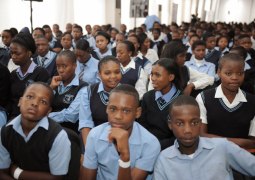
Parliament, Tuesday, 13 June 2017 – Parliament’s Portfolio Committee on Basic Education welcomed the increase in the pass rate in the consolidated National Senior Certificate (NSC) examinations, which show a 74.5% pass rate for the combined 2016 NSC and 2017 supplementary examinations. The pass rate for the combination in 2015/2016 was 72.1%.
Committee Chairperson Ms Nomalungelo Gina commended the Department for the increase, saying that support programmes provided to learners re-writing examinations “are paying off and showing positive results”.
Ms Gina further welcomed the proposal by the Department of Basic Education to merge the supplementary examinations and senior certificate examinations in an attempt to provide greater support to learners who wish to re-write examinations.
The Committee had a presentation from the Department on this matter today and heard that currently three examinations are being conducted for Grade 12s: the NSC examination, the supplementary examinations and the old Senior Certificate (SC) examinations. The latter exam was phased out in 2008, but the Department of Basic Education has made provision for learners already in the system who have not yet managed to pass their final exams.
The Committee heard that the Department is considering merging the SC examinations, written in June each year, with the supplementary examinations, normally written in March and which are provided for those learners who fail to pass Grade 12 the previous year. The Department now proposes to merge the two and for the combined exams to be written in June each year.
The Department believes that this will ensure that learners intending to write supplementary examinations will have a longer opportunity to prepare for their exams. The Director-General in the Department of Basic Education, Mr Mtanzima Mweli, said the period between getting initial results in January and the current supplementary examinations is about six weeks. “This leaves very little time for a weak learner who did not manage to pass. They need all the support they can get. The support programmes, including broadcast and face-to-face teaching, introduced by the Department in 2016 will assist with this.”
The Department also indicated its concern regarding the high rate of “no-shows” for the supplementary examinations, in large part because of a lack of confidence, it believes. The cost involved in administering these examinations was also highlighted as a concern. This proposal will be issued for public comment.
The Committee further received a presentation on the reconfiguration of the Annual National Assessment (ANA). The Department indicated that a pilot project on the new National Integrated Assessment Framework (NIAF) will be conducted towards the end of year. The NIAF will comprise systemic assessment, summative assessment and diagnostic/formative assessment.
The systemic assessment will evaluate the health of the system and will be sample based. It will be administered to Grades 3, 6 and 9 once every three years. The summative assessment would mean that all learners in a grade will write an examination, with a focus on Grades 6 and 9, that will form part of the end-of-year exams. The diagnostic/formative assessment will be used by teachers to identify learning gaps.
The Committee heard that the Department had continuous engagement with teachers’ trade unions, which support the systemic evaluation and the diagnostic tier. However, consensus has not been reached on the summative assessment and discussions are ongoing.
Ms Gina said the Committee will closely monitor the inputs from the public and the pilot project of the NIAF.
ISSUED BY PARLIAMENTARY COMMUNICATION SERVICES ON BEHALF OF THE CHAIRPERSON OF THE PORTFOLIO COMMITTEE ON BASIC EDUCATION, MS NOMALUNGELO GINA
For media enquiries or interviews with the Chairperson, please contact:
Name: Rajaa Azzakani (Ms)
Parliamentary Communication Services
Tel: 021 403 8437
Cell: 081 703 9542

